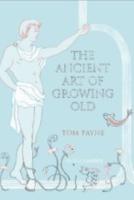
Vintage (2015) h/b 176pp £14.99 (ISBN 9780099573173)
Cicero, composing his thoughts on old age (de senectute) through the mouth of the famous old Roman Cato the elder (maior—and greater?), is the star of this thoroughly enjoyable read. Admittedly P. takes about 40 pages to get going—too much worrying about whether we really can learn from the ancients, as if we cannot make up our own minds—but when he finally hits his straps he calls in aid rafts of celebs past and present, from Moses Finley and Mary Beard through Health Secretary Jeremy Hunt to Aristotle, Plutarch and Seneca, to run round the issues from both ancient and modern perspectives. It ends with a translation of Cicero’s thesis.
P. starts by discussing what ‘old’ actually meant in ancient times. Of those who reached adolescence (only 66% made it to 10), perhaps 6-8% made 60, 3% made 80. Solon divided life up into 7 stretches of ten years, Pythagoras into four of 20. Others took the number 7 as the important marker, regarding 63 as the point when decline set in. But is it really inability to do things that defines the old, P. muses.
Some ancients combated looking old as keenly as we do (not Cicero, who never mentions it); Ovid had suggestions for women about keeping their looks and locks (take 12 narcissus bulbs…). But what of sex? Sophocles is said to have been relieved that he had finally escaped that ‘savage, raging tyrant’; for the ancient male it was the old woman gasping for sex that was the big turn-off. The liberal Ovid, as ever, disagreed, favouring experience and technique. Our sources leave us without a female voice on the subject.
The ancients have a reputation for respecting old age and looking after their elderly, the young learning how to do it by observing their parents caring for their parents in old age. But there was no concept of ‘retirement’ (invented by Bismarck in 1881)—you worked till you dropped—and there was no state provision for the elderly (‘public money feeding the idle’). No wonder the aged had a reputation for meanness: they needed every sesterce they could find. Cicero advised that the key to a healthy old age was a healthy youth, physical and mental: that was the best way to prepare for it.
P. ends with a chapter on the decline of mental powers. Even the satirist Juvenal lamented the onset of dementia—‘forgetting slaves’ names, or the face of a friend who came round for supper last night, or the children one reared’. Cicero recommended exercising the mind to keep decline at bay, quoting Solon: ‘I grow old learning something every day’. In this respect the educated Roman who had learnt Greek was at an advantage, a second language being an acknowledged anti-Alzheimeric.
But ultimately for the ancients, it was all a matter of philosophy, not in our sense, but in the cognitive sense: what counted was how they prepared for and got their brain round it.
Peter Jones
